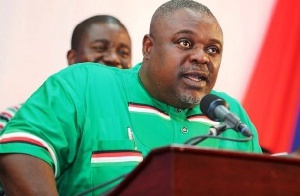“I never saw the Vice President of His Excellency President John Evans Atta-Mills pay the kinds of compliments Vice President Bawumia pays to President Akufo-Addo,” NDC’s Koku Anyidoho wrote on Twitter recently, adding a photograph of Vice President Bawumia bowing to President Akufo-Addo when the Supreme Court dismissed Mahama’s election petition.
Samuel Koku Anyidoho has been incessantly taunting former President John Dramani Mahama especially, and the NDC on his social media.
Prior to him becoming the President of Ghana on July 24, 2012, John Dramani Mahama, the then Vice President of Ghana felt sidelined by some “walls of competing interests built around” the late President John E. Atta-Mills, Manasseh Azure Awuni wrote in his book “The Fourth John: Reign, Rejection and Rebound”.
According to Manasseh Azure Awuni, Mahama not getting access to his boss President Atta-Mills, on certain issues gave him a lot of emotional distress.
Mrs Lordina Mahama reported her husband’s plight to the late President Atta-Mills, adding that the situation had affected John Dramani Mahama’s conjugal role in his house.
Manasseh Azure Awuni’s book revealed that President Atta-Mills then acted swiftly, reassuring Vice President Mahama to feel free and operate.
Samuel Koku Anyidoho, the former Communications Director at the presidency was one person who came across as “powerful” and could even take decisions in the name of President Atta-Mills without his consent or knowledge.
Manasseh Azure Awuni’s book cited an example whereby in June 2012 during a Black Stars qualifying match in Kumasi, there was a power outage at the stadium, disrupting the game which was being broadcast live.
Anyidoho quickly went on air on Accra-based Joy FM and said: “President Atta-Mills is upset and everybody who has a role to play in this will have their heads roll.”
He added that the Ashanti Regional Director of the Electricity Company of Ghana (ECG) would be fired and “all those in the line of fire would be fired”.
The famous “heads must roll” comment from Koku Anyidoho, Manasseh Azure Awuni explained, was not coming from President Atta-Mills because a statement from Fritz Baffour, the then Minister for Information, denied such a directive.
“The President has given no such directive and it is therefore not true that the ECG boss in the Ashanti Region has been fired.”
Koku Anyidoho’s attitude of conveying information not sanctioned by authority, according to the book, gave Vice President Mahama, who had been asked to take charge of affairs at the presidency because of the ill-health of President Atta-Mills, a lot of headaches.
“He was supposed to be in charge because the president was not healthy, but the attitude of some presidential staffers and ministers upset him so badly that he once decided to quit as vice president,” Manasseh Awuni wrote.
“The Chief Director at the Office of the Vice President had returned from lunch break to find the typist in the office seriously typing a letter. Official letters often passed through him (the Chief Director), and he then assigned the typist to work on them.
But this was an exception. When he asked the typist what he was typing, he said the vice president had given him something to type but he would not speak when asked what it was. Perhaps the content was too heavy for his mouth.
The Chief Director then drew closer to him and looked at the screen of the computer. What greeted him from the screen, alarmed him. It was Vice President John Mahama’s resignation letter that was almost ready. He didn’t have the time to read the full letter. He ordered the typist to stop typing and he headed for John Mahama’s office,” page 65 of the book reads.
As fate would have it, President Atta-Mills died on July 24, 2012, and Vice President Mahama took over as President and went ahead to contest and win the 2012 election.
“The Vice President, who did not have much power or influence within the presidency, suddenly had ultimate state power,” Manasseh wrote.





Politics of Tuesday, 9 March 2021
Source: www.ghanaweb.com













